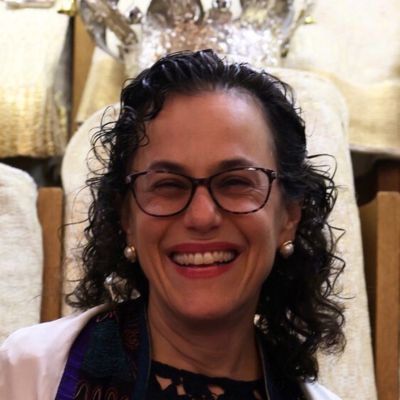Convinced I was going to medical school, I took a Christian Spirituality class for fun. I reflected on my own spiritual journey through discussions and papers. The Catholic chaplain teaching the class told me that I should become a rabbi. Shocked, I dismissed her immediately. Three years later, in my rabbinical school application essay, I credited Chaplain Liz Carr for the inspiration to become a rabbi. She saw what no one else had.
There is a parallel with the king of Moab, Balak. Balak is scared. The Israelites marched close to his land and defeated other nations. And there were lots of them. (Numbers 22:3) Balak looks at the Israelite nation but is blinded by his fear. He can only see a multitude, whose numbers are so vast that Balak cannot even see the ground on which they stand. (Numbers 22:5) He hires a pagan prophet, Balaam, to curse the Israelites, so that Balak can successfully battle them.
Balaam has his own limitations with sight. Balaam commits to only doing what God wants, but God obscures Balaam’s view so that he does not see the angel of God blocking his donkey’s path. After Balaam beats the donkey three times, because he thinks it is mocking him, God uncovers his eyes. Balaam now has true vision.
Find more commentaries on Parshat Chukat-Balak.
Balak and Balaam travel together to Kiriath-huzoth, where they make sacrifices and prepare for the curses. The verse then says that “he could see a portion of the people.” (Numbers 22:41) While it is unclear who the “he” is, it seems it is Balak, whose vision is imperfect. On the third attempt to curse the Israelites, Balaam “turned his face…. and saw Israel encamped tribe by tribe.” (Numbers 24:1-2) His sight is clear, and he blesses Israel.
Here in our sacred text we have a pagan prophet who gives us four beautiful blessings from our God. This is told as a story between Balak and Balaam. The Israelites are not the main characters here. We do not even hear Israelite voices. We only know them through the eyes of Balak and Balaam, two non-Jews. Yet we include this story in the Jewish Torah.
In today’s America, most of us are surrounded by people just like us. As a liberal Jew, I spend my time mostly with other liberal people. We challenge each other, but often we see the world in a similar way. With all the hatred and violence around us, we know that we need to associate with those with other perspectives. We aspire to break down the misunderstandings and assumptions we each hold. But many times when we do manage to speak to others with different viewpoints, we do so only in order to convince them to see the world as we do. This story is showing us that being with others can help us see ourselves more clearly. It took two non-Jews for us to discover how great we were! Balak needed convincing as well. He thought of us only as the enemy. He saw our numbers and feared us. Balaam saw the same Israelite nation but flipped the meaning of what he saw. He declared us tov, or good. Our throng was reinterpreted as positive and worthy.
Sign up to receive (M)oral Torah in your inbox each week.
Did we know that we are favorable because Balaam told us? Possibly, we already felt this from being God’s chosen people. Or maybe we did not. We certainly complained about our lot when we were wandering in the desert. I like to imagine that Balaam’s words changed us and shook us out of our complaining so that we could see ourselves in a fresh way. These words clearly are important, as we made them some of the first words we say every day when entering the synagogue.
What would happen to our community if we reached across divides to connect with others who are different from ourselves? Would we hold a mirror to others so that they could see themselves more clearly? Would we shift our own views of ourselves as we learn what we look like from the outside? Would we connect more deeply, so we could ally ourselves with other groups whom we assume do not share our views? Could we see groups like evangelicals as fellow God-centered people who might fight alongside us in helping the vulnerable in our world, such as refugees?
I often have thanked Liz Carr for showing me something that was hidden from myself. I thank Balaam for revealing our greatness. And I push all of us to seek those voices and those perspectives that allow us to see ourselves anew.
Rabbi Beth Janus is a chaplain and community rabbi in Philadelphia. She is currently the co-president of the Philadelphia Board of Rabbis. This piece came from conversations with her husband, Seth Lieberman.

